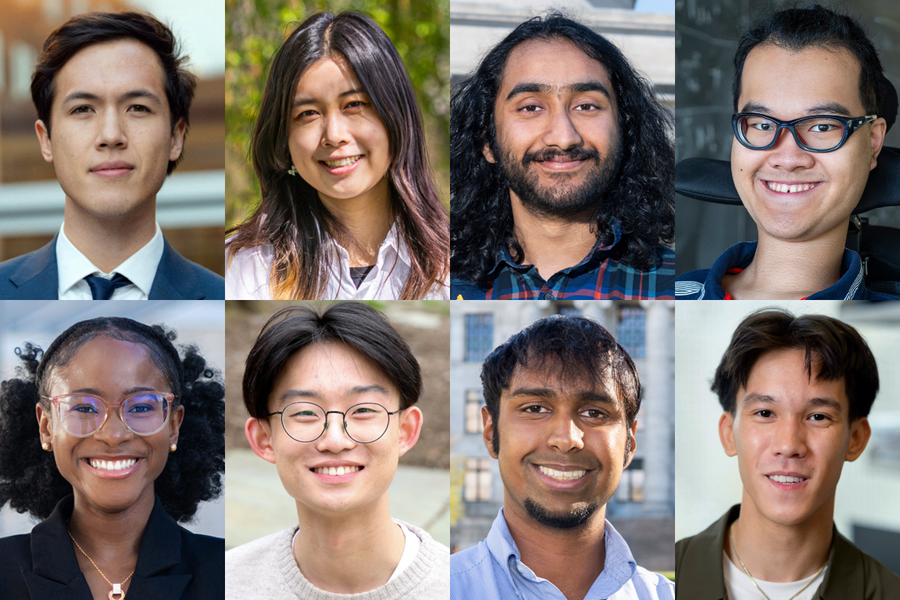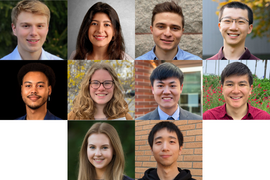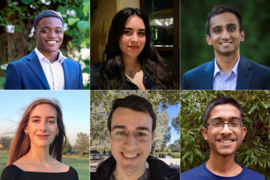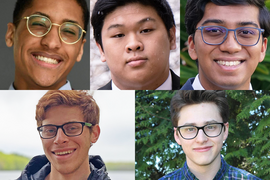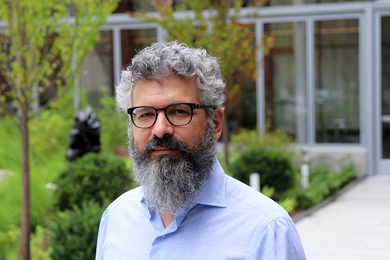The Hertz Foundation announced that it has awarded fellowships to eight MIT affiliates. The prestigious award provides each recipient with five years of doctoral-level research funding (up to a total of $250,000), which gives them an unusual measure of independence in their graduate work to pursue groundbreaking research.
The MIT-affiliated awardees are Matthew Caren ’25; April Qiu Cheng ’24; Arav Karighattam, who begins his PhD at the Institute this fall; Benjamin Lou ’25; Isabelle A. Quaye ’22, MNG ’24; Albert Qin ’24; Ananthan Sadagopan ’24; and Gianfranco (Franco) Yee ’24.
“Hertz Fellows embody the promise of future scientific breakthroughs, major engineering achievements and thought leadership that is vital to our future,” said Stephen Fantone, chair of the Hertz Foundation board of directors and president and CEO of Optikos Corp., in the announcement. “The newest recipients will direct research teams, serve in leadership positions in our government and take the helm of major corporations and startups that impact our communities and the world.”
In addition to funding, fellows receive access to Hertz Foundation programs throughout their lives, including events, mentoring, and networking. They join the ranks of over 1,300 former Hertz Fellows since the fellowship was established in 1963 who are leaders and scholars in a range of technology, science, and engineering fields. Former fellows have contributed to breakthroughs in such areas as advanced medical therapies, computational systems used by billions of people daily, global defense networks, and the recent launch of the James Webb Space Telescope.
This year’s MIT recipients are among a total of 19 Hertz Foundation Fellows scholars selected from across the United States.
Matthew Caren ’25 studied electrical engineering and computer science, mathematics, and music at MIT. His research focuses on computational models of how people use their voices to communicate sound at the Computer Science and Artificial Intelligence Lab (CSAIL) and interpretable real-time machine listening systems at the MIT Music Technology Lab. He spent several summers developing large language model systems and bioinformatics algorithms at Apple and a year researching expressive digital instruments at Stanford University’s Center for Computer Research in Music and Acoustics. He chaired the MIT Schwarzman College of Computing Undergraduate Advisory Group, where he led undergraduate committees on interdisciplinary computing AI and was a founding member of the MIT Voxel Lab for music and arts technology. In addition, Caren has invented novel instruments used by Grammy-winning musicians on international stages. He plans to pursue a doctorate at Stanford.
April Qiu Cheng ’24 majored in physics at MIT, graduating in just three years. Their research focused on black hole phenomenology, gravitational-wave inference, and the use of fast radio bursts as a statistical probe of large-scale structure. They received numerous awards, including an MIT Outstanding Undergraduate Research Award, the MIT Barrett Prize, the Astronaut Scholarship, and the Princeton President’s Fellowship. Cheng contributed to the physics department community by serving as vice president of advocacy for Undergraduate Women in Physics and as the undergraduate representative on the Physics Values Committee. In addition, they have participated in various science outreach programs for middle and high school students. Since graduating, they have been a Fulbright Fellow at the Max Planck Institute for Gravitational Physics, where they have been studying gravitational-wave cosmology. Cheng will begin a doctorate in astrophysics at Princeton in the fall.
Arav Karighattam was home schooled, and by age 14 had completed most of the undergraduate and graduate courses in physics and mathematics at the University of California at Davis. He graduated from Harvard University in 2024 with a bachelor’s degree in mathematics and will attend MIT to pursue a PhD, also in mathematics. Karighattam is fascinated by algebraic number theory and arithmetic geometry and seeks to understand the mysteries underlying the structure of solutions to Diophantine equations. He also wants to apply his mathematical skills to mitigating climate change and biodiversity loss. At a recent conference at MIT titled “Mordell’s Conjecture 100 Years Later,” Karighattam distinguished himself as the youngest speaker to present a paper among graduate students, postdocs, and faculty members.
Benjamin Lou ’25 graduated from MIT in May with a BS in physics and is interested in finding connections between fundamental truths of the universe. One of his research projects applies symplectic techniques to understand the nature of precision measurements using quantum states of light. Another is about geometrically unifying several theorems in quantum mechanics using the Prüfer transformation. For his work, Lou was honored with the Barry Goldwater Scholarship. Lou will pursue his doctorate at MIT, where he plans to work on unifying quantum mechanics and gravity, with an eye toward uncovering experimentally testable predictions. Living with the debilitating disease spinal muscular atrophy, which causes severe, full-body weakness and makes scratchwork unfeasible, Lou has developed a unique learning style emphasizing mental visualization. He also co-founded and helped lead the MIT Assistive Technology Club, dedicated to empowering those with disabilities using creative technologies. He is working on a robotic self-feeding device for those who cannot eat independently.
Isabelle A. Quaye ’22, MNG ’24 studied electrical engineering and computer science as an undergraduate at MIT, with a minor in economics. She was awarded competitive fellowships and scholarships from Hyundai, Intel, D. E. Shaw, and Palantir, and received the Albert G. Hill Prize, given to juniors and seniors who have maintained high academic standards and have made continued contributions to improving the quality of life for underrepresented students at MIT. While obtaining her master’s degree at MIT, she focused on theoretical computer science and systems. She is currently a software engineer at Apple, where she continues to develop frameworks that harness intelligence from data to improve systems and processes. Quaye also believes in contributing to the advancement of science and technology through teaching and has volunteered in summer programs to teach programming and informatics to high school students in the United States and Ghana.
Albert Qin ’24 majored in physics and mathematics at MIT. He also pursued an interest in biology, researching single-molecule approaches to study transcription factor diffusion in living cells and studying the cell circuits that control animal development. His dual interests have motivated him to find common ground between physics and biological fields. Inspired by his MIT undergraduate advisors, he hopes to become a teacher and mentor for aspiring young scientists. Qin is currently pursuing a PhD at Princeton University, addressing questions about the behavior of neural networks — both artificial and biological — using a variety of approaches and ideas from physics and neuroscience.
Ananthan Sadagopan ’24 is currently pursuing a doctorate in biological and biomedical science at Harvard University, focusing on chemical biology and the development of new therapeutic strategies for intractable diseases. He earned his BS at MIT in chemistry and biology in three years and led projects characterizing somatic perturbations of X chromosome inactivation in cancer, developing machine learning tools for cancer dependency prediction, using small molecules for targeted protein relocalization and creating a generalizable strategy to drug the most mutated gene in cancer (TP53). He published as the first author in top journals, such as Cell, during his undergraduate career. He also holds patents related to his work on cancer dependency prediction and drugging TP53. While at the Institute, he served as president of the Chemistry Undergraduate Association, winning both the First-Year and Senior Chemistry Achievement Awards, and was head of the events committee for the MIT Science Olympiad.
Gianfranco (Franco) Yee ’24 majored in biological engineering at MIT, conducting research in the Manalis Lab on chemical gradients in the gut microenvironment and helping to develop a novel gut-on-a-chip platform for culturing organoids under these gradients. His senior thesis extended this work to the microbiome, investigating host-microbe interactions linked to intestinal inflammation and metabolic disorders. Yee also earned a concentration in education at MIT, and is committed to increasing access to STEM resources in underserved communities. He co-founded Momentum AI, an educational outreach program that teaches computer science to high school students across Greater Boston. The inaugural program served nearly 100 students and included remote outreach efforts in Ukraine and China. Yee has also worked with MIT Amphibious Achievement and the MIT Office of Engineering Outreach Programs. He currently attends Gerstner Sloan Kettering Graduate School, where he plans to leverage the gut microbiome and immune system to develop innovative therapeutic treatments.
Former Hertz Fellows include two Nobel laureates; recipients of 11 Breakthrough Prizes and three MacArthur Foundation “genius awards;” and winners of the Turing Award, the Fields Medal, the National Medal of Technology, the National Medal of Science, and the Wall Street Journal Technology Innovation Award. In addition, 54 are members of the National Academies of Sciences, Engineering and Medicine, and 40 are fellows of the American Association for the Advancement of Science. Hertz Fellows hold over 3,000 patents, have founded more than 375 companies, and have created hundreds of thousands of science and technology jobs.
